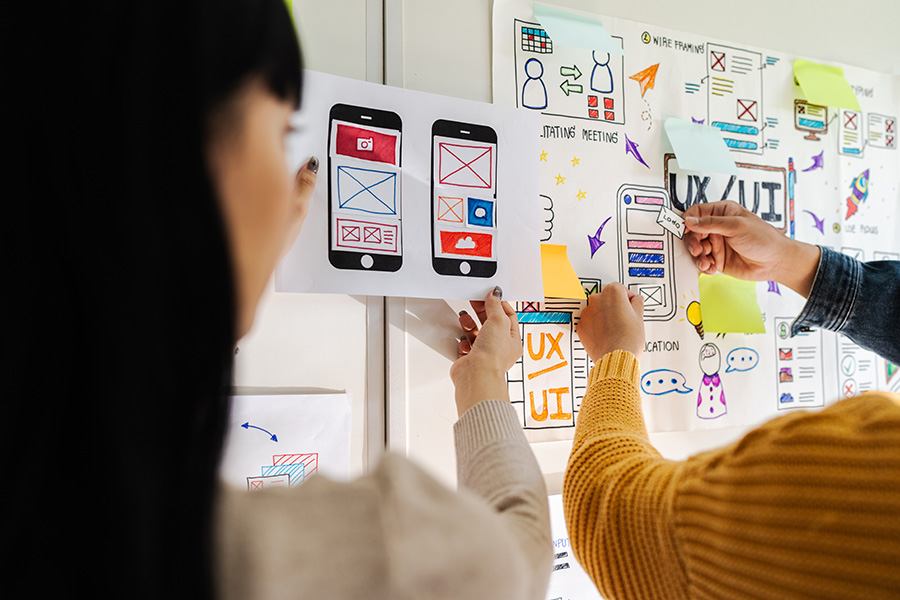What is App Design
App design refers to the process of developing the user interface (UI) and user experience (UX) of a mobile or web application. It involves planning and arranging the elements of an app to ensure it is attractive, functional, and easy to use. App design is a multifaceted discipline that includes several key components.
Key Components of App Design
User Interface (UI) Design
User Interface (UI) design focuses on the visual and interactive elements of a digital product. It involves crafting layouts, colors, typography, images, buttons, and animations to create an interface that is both aesthetically pleasing and easy for users to understand and navigate.
- Visuals – colors, fonts, icons, images, buttons, and other visual elements that shape the app’s appearance.
- Layout – the arrangement of these elements on the screen, ensuring they are visually appealing and intuitive.
- Responsiveness – ensuring the design adapts smoothly to different screen sizes and devices.
User Experience (UX) Design
User Experience (UX) design centers on understanding users’ needs, behaviors, and pain points. It aims to create seamless, intuitive, and enjoyable interactions between users and digital products by focusing on usability, accessibility, and the overall emotional impact of the experience.
- Functionality – what the app actually does, what problems it solves for users, and the features it offers.
- Navigation – how users move through the app, finding what they need. Think menus, buttons, and the overall flow.
- Usability – making the app easy to learn, efficient to use, and satisfying to interact with.
Interaction Design (IxD)
Interaction Design (IxD) focuses on creating engaging interfaces with well-thought-out behaviors. It involves designing how users interact with digital products and services, encompassing everything from clicking a button to swiping a screen. Interaction design aims to create systems that facilitate effective and intuitive user interactions, emphasizing the creation of a seamless and efficient user experience.
- Feedback – providing visual or haptic cues (like subtle vibrations) in response to user actions.
- Animations and Transitions – using movement to guide the user’s attention and make the app feel more dynamic.
Wireframing and Prototyping
This is a crucial stage in app design, where designers create a basic layout of the app’s screens (wireframe) and then develop a working model (prototype) to test the functionality and flow of the app.
Wireframing
A wireframe is a basic visual blueprint of an app’s layout, focusing on the structure and arrangement of elements like buttons, text, and images. Think of it like a simplified architectural drawing.
Prototyping
A prototype is a more interactive simulation of the app’s functionality. It can range from simple clickable wireframes (low-fidelity) to highly detailed models that closely mimic the final product (high-fidelity). Prototypes are used to test navigation flow and user interactions.
The Goal of App Design
- Solve Problems and Provide Value: The core purpose of an app should be to address a specific need or pain point for its target audience. It should offer a solution or make users’ lives easier in some tangible way.
- Ease of Use: A well-designed app is intuitive. Users can quickly understand how to navigate it, accomplish tasks efficiently, and learn to use it with minimal effort.
- Positive User Experience: The interactions should be smooth, satisfying, and maybe even delightful. The app needs to function reliably and be free of frustrating hurdles that detract from the overall experience.
- Visual Appeal: A well-designed app is aesthetically pleasing. It uses colors, typography, and visual elements in a way that’s attractive and aligns with the app’s brand or purpose.
In summary, app design is not just about making an app look good; it’s about creating a seamless, intuitive, and enjoyable experience for the user, from the moment they download the app to each interaction they have with it. It’s a blend of art, science, and technology, requiring skills in graphic design, psychology, and software development.
Here is more information on App Design Tools.
